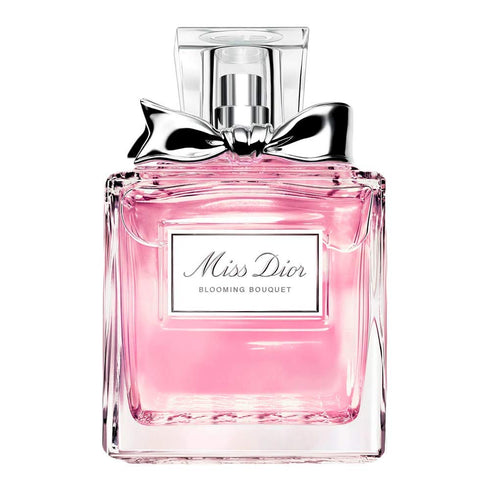- Home
- Dior Miss Dior Blooming Bouquet - Tester - HAUTE Parfums

Dior Miss Dior Blooming Bouquet - Tester - HAUTE Parfums
Miss Dior Blooming Bouquet is a fresh and tender fragrance. Composed like a bouquet of newly blossomed flowers, this eau de toilette is characterised by notes of Damascus rose, peony, Calabrian bergamot and white musks. Faceted and spontaneous, its richly contrasted trail has all the emotion of that feeling of love at first sight.
The signature couture Miss Dior bow, meticulously woven with multicoloured threads, gives the Miss Dior Blooming Bouquet bottle an even more couture identity. Created by Maison Faure, artisanal ribbon-makers since 1864, this ribbon demonstrates precision expertise.
- Christian Dior Miss Dior Blooming Bouquet eau de parfum
- Notes: Damascus rose, peony, Calabrian bergamot and white musks.
- Original packaging is for reference only and is not included.
- 150 gram (weight)
- RRP £120 per 100ml
The lists of ingredients that make up the composition of parfums products are regularly updated. Commonly used ingredients are:
Alcohol ● Parfum (Fragrance) ● Aqua (Water) ● Alpha-isomethyl Ionone ● Benzyl Salicylate ● Limonene ● Linalool ● Ethylhexyl Methoxycinnamate ● Diethylamino Hydroxybenzoyl Hexyl Benzoate ● Citronellol ● Geraniol ● BHT ● Oil Extracts ● Citral ● Benzyl Alcohol ● Benzyl Benzoate ● Eugenol ● Coloring Agents ● Tocopherol ● DPG
The manufacturer is responsible for the ingredients of the product. We recommend checking the list of product ingredients directly on the manufacturer's website due to potential changes. Periodic updates to EU regulations could demand the for manufacturers to re-formulate existing fragrances to meet new regulations.
Be aware that large neck roller bottles may contain polymers to reduce leakage in according to regulatory packaging requirements. Roller bottles should not be transferred into spray bottles.
Allergies or Sensitivities:
If you suffer allergies or sensitivies, and before using a perfume product or the long-term use of fragrances, please check the latest updated list of ingredients from the original manufacturer to be certain that the ingredients are suitable for your personal use as they may differ, be updated or changed with new released batches.
Perfumes can also be used on clothes instead of skin to reduce direct skin contact. However, due to alcohol content or thickening agents, perfumes can have a small negative effect on fabrics:
The (EU) Cosmetics Regulation 1223/2009 lists the 26 most-known allergenic substances, which you can find in the link below:

